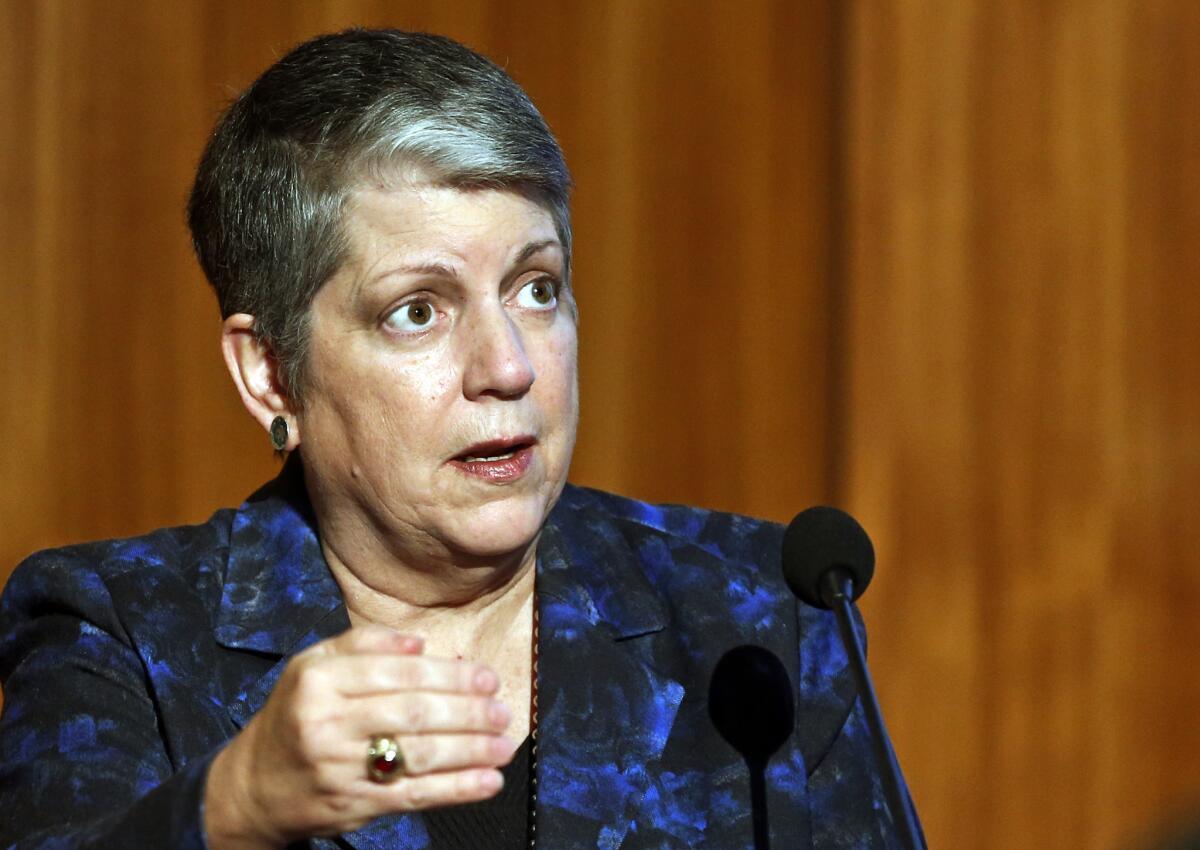UC president calls for stronger steps in faculty sexual harassment cases

University of California President Janet Napolitano said of a review of faculty sexual harassment guidelines that recommendations failed to make sure investigations were effective and sanctions fit the offense.
- Share via
A review of sexual harassment policies involving faculty at the University of California has failed to make sure that investigations are effective, cases are consistently handled and sanctions are strong enough to fit the offense, according to UC President Janet Napolitano.
In a letter released Monday, Napolitano directed the 10-member review committee to find a way to speed up investigations and establish a broader group of campus members to propose sanctions, which are currently decided by top administrators.
But she praised the committee’s work in other areas and ordered immediate steps to implement some of its recommendations. They included requiring that all sexual misconduct investigations be reported to the campus chancellor and indefinitely retaining records on faculty sanctions in order to identify repeat offenders.
To better protect victims, Napolitano directed that each campus designate someone to work confidentially with faculty, graduate students and academic employees such as librarians and postdoctoral scholars who believe they have been sexually harassed but are reluctant to make a formal claim with campus officials. Such “confidential advocates” have already been assigned for undergraduate students.
“While UC has made progress over the past year and a half on faculty sexual harassment cases, several cases that have recently come to light make clear that we have much more work to do,” she wrote in her letter.
In recent months, administrators at UC Berkeley and UCLA have been widely criticized for failing to adequately discipline high-profile faculty members accused of violating the university’s sexual harassment policies.
At Berkeley, law school Dean Sujit Choudhry, astronomer Geoff Marcy and Vice Chancellor of Research Graham Fleming were allowed to retain campus positions after receiving sanctions that critics found unacceptably weak, such as pay cuts, fines, mandatory counseling and orders to issue apologies.
In a 2014 settlement at UCLA, administrators agreed to drop a Title IX sexual harassment investigation of history professor Gabriel Piterberg in exchange for a $3,000 fine, an 11-week suspension and other discipline measures. Piterberg did not admit to allegations that he repeatedly harassed two female graduate students over many years by making sexual comments, pressing himself against their bodies and forcing his tongue into their mouths.
Critics of the current system include UAW Local 5810, which represents 6,000 postdoctoral scholars, and Local 2865, which represents graduate students throughout the UC system. Union officials have said that they were not given adequate chances for input into the sexual harassment review process and that the Academic Senate had disproportionate influence in how cases were handled.
Among other things, the union opposed plans to require their members to report sexual harassment violations, saying it would create additional work and violate the privacy of victims.
The UC review of faculty guidelines was launched in October as part of a comprehensive look at sexual harassment policies throughout the 10-campus system. The committee was made up of administrators, faculty and two students.
In the report, which Napolitano released Monday along with her letter, the review committee said that the campuses could not provide detailed data on faculty cases and that record-keeping needed to be drastically improved. Eight campuses provided partial data showing that 76% of 141 allegations made against faculty members from 2012 through 2015 were unsubstantiated or settled without a formal investigation. Among 34 cases investigated, allegations in 11 of them were substantiated.
The committee also found widespread confusion and misunderstanding about the policies on campuses and no consensus on what should be done to improve the situation.
One of the biggest problems involved the secrecy surrounding faculty cases. The committee recommended that those bringing a complaint should be informed of the outcome; Napolitano already has said that substantiated cases of sexual misconduct are public.
To address concerns about the lengthy process, Napolitano ordered new rules to require that cases be completed within five months — three for the investigation and two for adjudication — unless there are “exceptional circumstances.” She also directed the committee to get rid of a 10-day deadline for filing charges after placing an accused faculty member on involuntary leave.
Another major complaint involved a rule that requires investigations to be launched within three years after administrators learn of allegations. Napolitano asked the review committee to reconsider the time limit in cases where an official failed to inform the Title IX office of potential cases of sexual misconduct.
“Given the seriousness of these cases and the shortcomings that have been identified with existing processes ... this work is crucial,” Napolitano wrote. “We must develop and implement policies and procedures that enable the university to respond effectively to reports of faculty sexual harassment and sexual violence and to deal with substantiated cases firmly, fairly [and] promptly.”
For more education news, follow me @TeresaWatanabe
More to Read
Sign up for Essential California
The most important California stories and recommendations in your inbox every morning.
You may occasionally receive promotional content from the Los Angeles Times.














